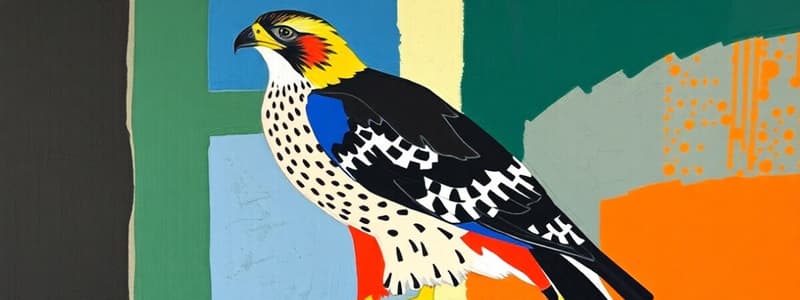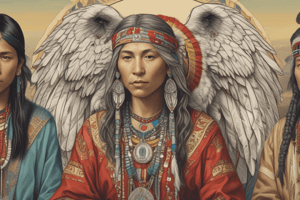Podcast
Questions and Answers
What is the primary focus of Helen Macdonald's 'H is for Hawk'?
What is the primary focus of Helen Macdonald's 'H is for Hawk'?
- A fictional narrative about training a goshawk.
- A historical account of falconry in England.
- A memoir detailing Macdonald's experiences in falcon conservation. (correct)
- A biography of T.H. White, author of 'The Goshawk'.
Helen Macdonald's father was not involved in falconry; she developed an interest in it independently.
Helen Macdonald's father was not involved in falconry; she developed an interest in it independently.
False (B)
What theme is introduced by the 'Article 10s' mentioned in the extract?
What theme is introduced by the 'Article 10s' mentioned in the extract?
The tension between freedom and captivity.
Macdonald uses the word 'tautly' to describe the man's ______.
Macdonald uses the word 'tautly' to describe the man's ______.
Match the literary devices used by Macdonald with their descriptions:
Match the literary devices used by Macdonald with their descriptions:
What does Macdonald mean when she says the hawk is like 'a fallen angel'?
What does Macdonald mean when she says the hawk is like 'a fallen angel'?
The extract concludes with Macdonald successfully acquiring the first hawk she saw.
The extract concludes with Macdonald successfully acquiring the first hawk she saw.
What is the significance of the simile comparing the hawk to 'a turkey in a butcher's shop'?
What is the significance of the simile comparing the hawk to 'a turkey in a butcher's shop'?
Macdonald compares the larger, older hawk to a character from a ______ melodrama.
Macdonald compares the larger, older hawk to a character from a ______ melodrama.
What is the effect of Macdonald's use of short, fragmentary sentences in the paragraph describing the opening of the box?
What is the effect of Macdonald's use of short, fragmentary sentences in the paragraph describing the opening of the box?
Macdonald immediately dislikes the first hawk she sees and is eager to exchange it for the larger one.
Macdonald immediately dislikes the first hawk she sees and is eager to exchange it for the larger one.
What does Macdonald mean when she says the hawk's gaze is like the 'whole world' has 'fallen into them'?
What does Macdonald mean when she says the hawk's gaze is like the 'whole world' has 'fallen into them'?
Macdonald describes the air turning 'syrupy, slow, and flecked with ______' as the box is opened.
Macdonald describes the air turning 'syrupy, slow, and flecked with ______' as the box is opened.
Match the following phrases from the extract with what they suggest about the hawk:
Match the following phrases from the extract with what they suggest about the hawk:
Why does Macdonald include details about the man's calm and practiced handling of the hawk?
Why does Macdonald include details about the man's calm and practiced handling of the hawk?
Macdonald's reference to Medea is meant to portray herself as a strong and capable figure.
Macdonald's reference to Medea is meant to portray herself as a strong and capable figure.
What is the significance of the breeder showing Macdonald the 'wrong bird'?
What is the significance of the breeder showing Macdonald the 'wrong bird'?
When the man takes the hawk, Macdonald says he is 'anchoring' the hawk's back against his ______.
When the man takes the hawk, Macdonald says he is 'anchoring' the hawk's back against his ______.
In the extract, what does Macdonald imagine the hawk is able to see for the first time?
In the extract, what does Macdonald imagine the hawk is able to see for the first time?
The word 'thump' is not emphasized when Macdonald first hears it.
The word 'thump' is not emphasized when Macdonald first hears it.
What does Macdonald mean when she says, 'Everything is brilliance and fury'?
What does Macdonald mean when she says, 'Everything is brilliance and fury'?
According to Macdonald, the hawk was thatched in an ______.
According to Macdonald, the hawk was thatched in an ______.
What do the following quotations mean?
What do the following quotations mean?
What is the meaning of, 'the sharp fingers of her dark-tipped primaries cutting the air'?
What is the meaning of, 'the sharp fingers of her dark-tipped primaries cutting the air'?
Macdonald is not grief stricken by her father's death.
Macdonald is not grief stricken by her father's death.
What play is Macdonald referencing when she talks about Madea?
What play is Macdonald referencing when she talks about Madea?
The first paragraph is deliberately ______ and low-key, which will form a contrast with the extremely poetic and startling language in the paragraphs to follow.
The first paragraph is deliberately ______ and low-key, which will form a contrast with the extremely poetic and startling language in the paragraphs to follow.
What does the phrase, 'alien brain fizzing and fusing with terror' mean?
What does the phrase, 'alien brain fizzing and fusing with terror' mean?
The man is surprised to see Macdonald.
The man is surprised to see Macdonald.
What does Macdonald call her request at the end of the story?
What does Macdonald call her request at the end of the story?
Macdonald says that, 'a great flood of ______ drenches us'.
Macdonald says that, 'a great flood of ______ drenches us'.
Match the author to the book.
Match the author to the book.
Why does Macdonald imagine the early life of the bird?
Why does Macdonald imagine the early life of the bird?
The man immediately lets Macdonald have the first bird.
The man immediately lets Macdonald have the first bird.
What is dangerous and uncontrollable bird compared to?
What is dangerous and uncontrollable bird compared to?
By coincidence of world and deed a great flood of ______ drenches us.
By coincidence of world and deed a great flood of ______ drenches us.
What is the effect upon Macdonald of seeing two enormous eyes?
What is the effect upon Macdonald of seeing two enormous eyes?
Macdonald already has a permanent place to live.
Macdonald already has a permanent place to live.
What does the man say about the hood?
What does the man say about the hood?
Macdonald describes that the final paragraph hints that these appeals ______ the man.
Macdonald describes that the final paragraph hints that these appeals ______ the man.
Match the term to what it means.
Match the term to what it means.
What is the significance of the Article 10 forms mentioned in the extract?
What is the significance of the Article 10 forms mentioned in the extract?
Macdonald immediately felt a strong connection and preference for the larger, older goshawk presented to her second.
Macdonald immediately felt a strong connection and preference for the larger, older goshawk presented to her second.
In the extract, Macdonald compares the older goshawk to a character from a Victorian melodrama. Which character does she reference, and what does this comparison suggest about the bird's demeanor?
In the extract, Macdonald compares the older goshawk to a character from a Victorian melodrama. Which character does she reference, and what does this comparison suggest about the bird's demeanor?
Macdonald uses the metaphor of something 'bright and distant, like ______ falling through water' to describe the terrible beauty and strangeness of the first goshawk.
Macdonald uses the metaphor of something 'bright and distant, like ______ falling through water' to describe the terrible beauty and strangeness of the first goshawk.
Match the literary devices used by Macdonald with their effect in the extract:
Match the literary devices used by Macdonald with their effect in the extract:
What does Macdonald mean when she says about the first hawk that 'She is a conjuring trick'?
What does Macdonald mean when she says about the first hawk that 'She is a conjuring trick'?
The man selling the goshawk immediately approves of Macdonald's request to switch to the younger bird.
The man selling the goshawk immediately approves of Macdonald's request to switch to the younger bird.
Explain why Macdonald describes herself as looking like Medea from a 'seaside production' in the final paragraph.
Explain why Macdonald describes herself as looking like Medea from a 'seaside production' in the final paragraph.
Macdonald describes the sound from the older bird as 'great, awful ______ of sound like a thing in pain.'
Macdonald describes the sound from the older bird as 'great, awful ______ of sound like a thing in pain.'
Why does Macdonald include detailed descriptions of what the goshawk might be seeing upon leaving its box?
Why does Macdonald include detailed descriptions of what the goshawk might be seeing upon leaving its box?
Flashcards
H is for Hawk
H is for Hawk
A memoir by Helen Macdonald detailing her experience of training a goshawk while grieving her father's death.
Helen Macdonald
Helen Macdonald
The author of "H is for Hawk", who uses falconry to cope with grief.
Helen Macdonald's Father
Helen Macdonald's Father
Introduced Helen Macdonald to falconry.
Article 10s
Article 10s
Signup and view all the flashcards
Hood
Hood
Signup and view all the flashcards
Imagery
Imagery
Signup and view all the flashcards
Simile
Simile
Signup and view all the flashcards
Empathy
Empathy
Signup and view all the flashcards
Metaphor
Metaphor
Signup and view all the flashcards
Understatement
Understatement
Signup and view all the flashcards
Melodrama
Melodrama
Signup and view all the flashcards
Allusion
Allusion
Signup and view all the flashcards
Caesura
Caesura
Signup and view all the flashcards
Diction
Diction
Signup and view all the flashcards
Syntax
Syntax
Signup and view all the flashcards
Study Notes
Helen Macdonald: Biography and Background
- Helen Macdonald, born in England in 1970, studied English Literature at Jesus College, Cambridge.
- She worked in falcon conservation and was a Research Fellow at Jesus College from 2004 to 2007.
- Macdonald is an author on the natural world, and her memoir "H is for Hawk" won the Samuel Johnson Prize for non-fiction in 2014.
- "H is for Hawk" is about Macdonald's grief after her father's death and her attempt to train a goshawk as a way to cope.
- She decides to find some meaning in her life by training a young goshawk, believing it will honor her father's memory.
- The story includes Macdonald's experience alongside that of T.H. White, who wrote about his own struggles to tame a goshawk in "The Goshawk" (1951).
Summary
- In the given extract, Macdonald is picking up a young goshawk from a breeder and is struck by the bird's intense presence.
- She uses expressive language to describe her first encounter with the bird and imagines the hawk's first experience of the outside world.
- A mix-up occurs, and the breeder shows Macdonald a different, larger bird than the one she expected.
- Macdonald insists on keeping the first bird she saw because she does not connect with the larger one.
Analysis: Initial Encounter and Tension
- The extract starts with dialogue, creating an immediate sense of being present with Macdonald and the breeder.
- The breeder's mention of "Article 1Os" forms introduces the theme of tension between freedom and captivity, referencing the paperwork required for the "captive-bred rare bird".
- The first paragraph is intentionally understated, which contrasts with the poetic language used later.
- The paragraph builds tension subtly, as Macdonald describes the flimsy boxes containing the birds.
- A sudden thump from within the box creates a startling moment, emphasized by the italicized word "thump."
- The man's concern about the hood being off the bird signifies potential danger or fear.
- Macdonald's statement "Like us" (referring to the hood) suggests that humans are also the "fearful sights" from which the hawk needs protection.
Literary Devices and Dramatic Imagery
- The paragraph describing the opening of the box (lines 11-31) uses literary devices and dramatic imagery.
- The first ten sentences contain only one main verb, using short, fragmentary sentences to slow down time and create tension.
- Phrases like "Another hinge untied. Concentration. Infinite caution." show a slow rhythm, indicated by repeated sounds.
- The image of "Daylight irrigating the box" is unusual, mixing sun and water imagery to highlight the experience and prepare the reader for unfamiliar language.
- The air turning "syrupy, slow, and flecked with dust" foreshadows an impending battle, adding to the ominous tone.
- A long sentence (lines 13-17) describes the goshawk leaving the box, using confusing writing to reflect Macdonald's and the hawk's shock.
- Alliteration and onomatopoeia ("chaotic clatter," "whirring," "twittering") mimic the sounds of the hawk's release.
- The repetition of "enormous" emphasizes Macdonald's shock at the bird's size.
- The phrase "coincidence of world and deed" refers to the sun appearing at the moment of the hawk's release.
- Water imagery ("flood," "drenches") mirrors the earlier "irrigating," highlighting the overwhelming impact of seeing the hawk.
- The sentence ends with "everything is brilliance and fury," using both light and emotion imagery.
Hawk's Appearance and Macdonald's Reaction
- A sentence lacking a main verb describes the hawk's appearance using alliteration: "The hawk's wings, barred and beating."
- The phrase "sharp fingers of her dark-tipped primaries cutting the air" refers to the hawk's main flight feathers.
- The simile "her feathers raised like the scattered quills of a fretful porpentine" uses another animal to describe the hawk's wings and nervousness.
- Between lines 19 and 23, Macdonald omits verbs, listing images to express what she sees with her heart jumping sideways.
- The hawk is compared to a reptile, a fallen angel (Lucifer), and a griffon from an illuminated bestiary to underline its otherworldly nature.
- The "fallen angel" reference implies the hawk's potential for evil alongside beauty.
- The griffon reference suggests that the goshawk is far beyond other everyday creatures.
- Macdonald uses nature imagery, comparing the hawk to "gold falling through water," but also acknowledges its fragility as "A broken marionette of wings, legs and light-splashed feathers".
- The simile of the hawk being held "like a turkey in a butcher's shop" highlights Macdonald's concern for the bird's vulnerability.
The Hawk's Perspective
- Macdonald imagines the hawk's perspective, contrasting its limited view from the aviary with its newfound freedom to see everything.
- Italics are used to emphasize the hawk's new freedom of vision: "she can see everything".
- She lists small details that the hawk might notice, such as "point source glitter on the waves" and "pigment flakes under wax on the lines of parked cars".
- Macdonald describes the bird's mind like a blank page, using a printing metaphor: "Everything startling and new-stamped on her entirely astonished brain."
The Breeder's Calmness and Macdonald's Empathy
- The narrative shifts back to the past tense, focusing on the man who brought the goshawk.
- The man is "perfectly calm," securing the hawk with practiced movements, described with images of security, anchoring the hawk against his chest and gripping the bird's legs.
- The word "tautly" describes the man's voice, which is an odd image, as it is very visual and usually describes how something looks, not how it sounds; tension can be imagined on his face caused by care.
- Macdonald imagines the hawk's early life, hatched in an incubator and hand-fed by the man, evoking a sense of connection.
- This causes Macdonald to feel sudden love for the man, revealed in the sentence "All at once I loved this man, and fiercely" (line 39-40) showing Macdonald's fragility and empathy.
- The hawk's "wild eyes" are linked to the color of "sun on white paper" to convey their intensity.
The Mistake and Its Impact
- Macdonald uses a short, verbless sentence ("One, two, three") to show the passage of time.
- As she hoods the bird, she imagines its brain "fizzing and fusing with terror," using alliteration and onomatopoeia.
- A shocking discovery is delivered with understatement: "It was the wrong bird. This was the younger one. The smaller one. This was not my hawk."
- This realization is emphasized with a one-word paragraph in italics: "Oh".
The Other Hawk and Macdonald's Desperation
- The larger, older hawk is described as a "madwoman in the attack," a reference to the "madwoman in the attic" from "Jane Eyre."
- This bird is "smokier and darker," its sounds described as "great, awful gouts of sound like a thing in pain."
- The word "gouts" is an unexpected and horrible image, typically associated with blood, that suggests that Macdonald is frightened of the new bird.
- Macdonald uses italics to heighten tension: "This is my hawk," followed by "This isn't my hawk," expressing her realization that she cannot take this more aggressive bird.
- The use of reported speech shows Macdonald's attempts to persuade the man to let her have the younger bird, starting politely but escalating to "a desperate, crazy barrage of incoherent appeals".
Conclusion and Cliffhanger
- The final paragraph hints that Macdonald's appearance of desperation may have swayed the man.
- She describes herself as a "tall, white-faced women with wind-wrecked hair," comparing herself to Medea from Greek theatre, driven mad by grief.
- The ending builds tension, leaving the reader wondering if the man will relent, concluding with a "cliff-hanger" and "a moment of total silence".
Studying That Suits You
Use AI to generate personalized quizzes and flashcards to suit your learning preferences.




